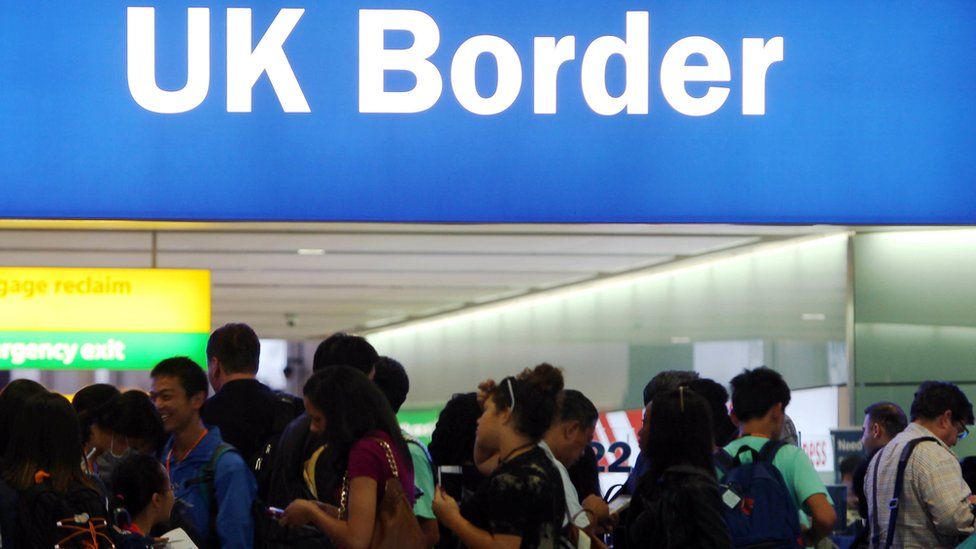ARTICLE AD BOX
 Image source, PA Media
Image source, PA Media
By Chris Mason
Political editor, BBC News
A big, stark number. And an ocean of nuance.
Net migration added 606,000 to the UK's population last year, according to the Office for National Statistics.
An estimated 1.2 million people arrived, while just over half a million left.
But migration is about so much more than just numbers.
It is about emotion, communities and public services. It is about promises, people and places.
Who and how many should the country welcome, from where and for how long?
I have been talking to people in Great Yarmouth in Norfolk about it.
The east of England is highly dependent on immigration - and Great Yarmouth overwhelmingly backed Brexit too.
The promises of three successive Conservative prime ministers were washed away by reality.
"Net migration will be in the order of tens of thousands each year, no ifs, no buts," claimed David Cameron.
There were lots of ifs and even more buts - he never got close.
"We believe sustainable numbers are the tens of thousands," repeated Theresa May. She never managed it either.
'Ease off a little'
Boris Johnson learnt the lesson of too specific a promise, and instead said: "numbers will come down, because we'll be able to control the system," as a consequence of Brexit.
He was right about the last bit, but save for the exceptional period of the pandemic, the numbers have done the opposite - they have rocketed.
In the Kings Arms in Caister-on-Sea, I chat to members of the local social club, who are having a lunchtime drink.
"I had a grandmother who came from Estonia when the Russians invaded, so I am a product of that. I do think it is important to take in people in need. But I think we have got to the point where we need to ease off a little," says Susie, sitting on a stool at the bar.
"That fairness seems to have been lost. It seems there is an influx of those who wish to come here to literally sponge off us and not contribute," her husband Owen adds.
"I think we need a certain influx to help us to work in this country. So I don't think you'll ever get it down to zero," says Mike.
Mike says there will always be a need for some immigration
The view at the Kings Arms is clear: providing a sanctuary for the desperate is admirable.
But when politicians talk about their post-Brexit capacity to control immigration, folk here simply don't believe that is actually what they are managing to do.
And the nature of immigration is changing too.
"Since Brexit, free movement has been switched off, so we are seeing less EU nationals moving into the town than we had pre Brexit, says Fiona Costello from the EU Migrant Worker Project at Cambridge University.
"But what we are seeing is some temporary visa schemes in its place. Different nationalities are now being able to move to the town, because these visa routes are open to EU and non EU communities," she adds.
Fiona Costello researches the impact of Brexit on migration
Perhaps a mile or so up the hill, Robert is being helped to exercise by Sandhya and Harjeet. They arrived from India two years ago, and now work at the Gresham Care Home.
Robert is paralysed and requires a lot of support.
Standing proudly in the corridor, is the owner and manager here, Vidia Ruhomutally.
She arrived in the UK from Mauritius decades ago, as homesick as she was ambitious to build a better life.
Years later, she runs a home accommodating around 40 residents. She's a significant employer too, providing jobs for over 70 people - the vast majority of whom she recruits from overseas.
The process is arduous: online interviews; buying up local property in which to put up her staff; helping them adjust to life in the UK.
She has found there is nowhere near enough local people willing to do the work.
"Without India, we wouldn't be here. And without us, the hospital would have bed blocking," she says.
"They wouldn't be able to release patients to me. We wouldn't be able to provide our community a service, if we didn't have the beds."
Vidia Ruhomutally arrived in the UK aged 18
For years, our leaders at Westminster offered promises on immigration without the full toolkit to deliver them.
This is no longer the case: after Brexit, all of the levers of control are in their hands.
But shoving them this way or that comes with trade-offs: societal, economic, political.
Rishi Sunak has re-written the Tory promise of 2019 to reduce net migration, which then stood at around a quarter of a million a year.
He has done so because he won't keep that promise.
Instead, he suggests, his target is the number he inherited, about half a million.
Close observers of the numbers tell me this should be achievable.
Come the general election, he, Keir Starmer and the other Westminster leaders will have to set out their own vision and priorities.
Migration: it's about promises, people and places - and our ongoing conflicted conversation over what to do about it.

 1 year ago
33
1 year ago
33








 English (US) ·
English (US) ·